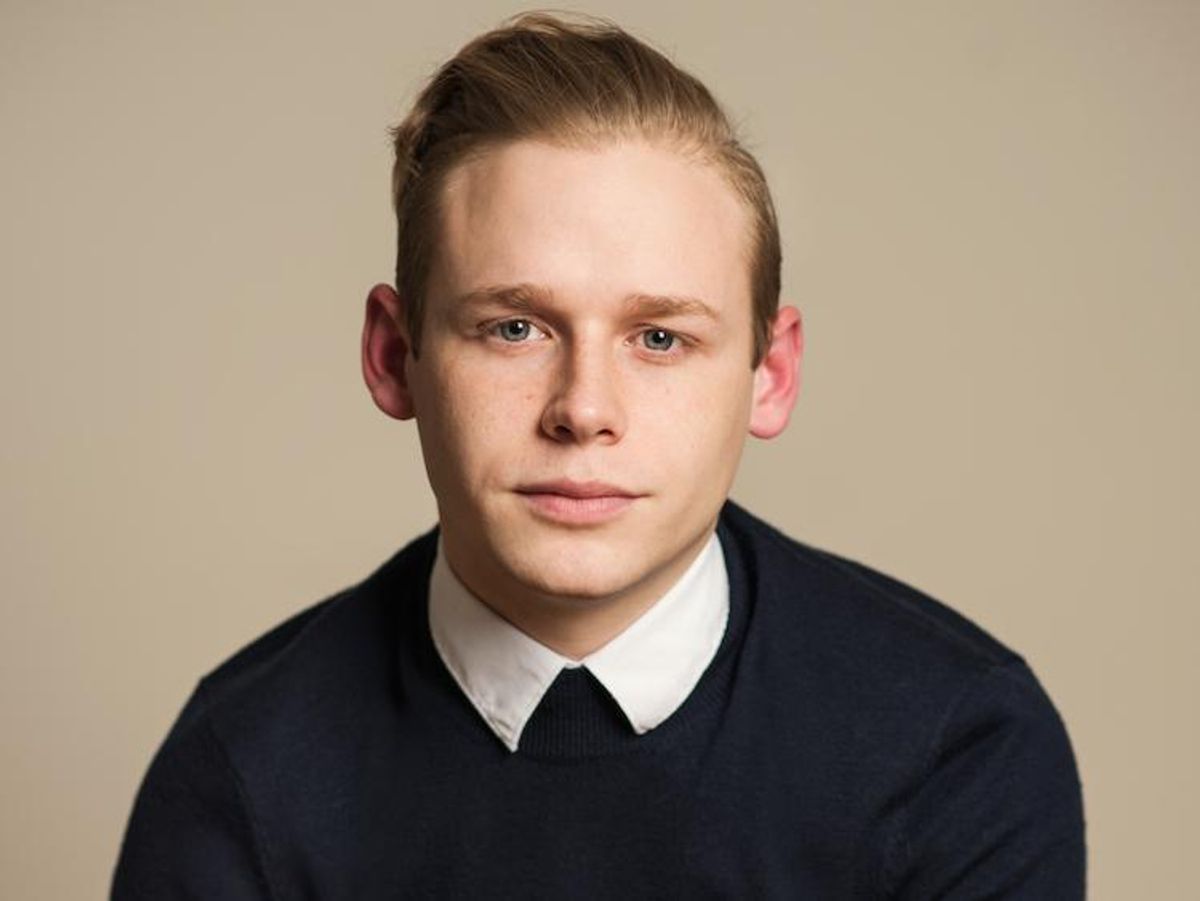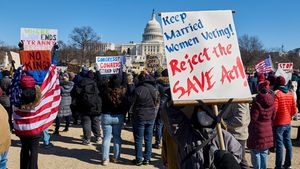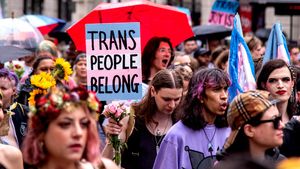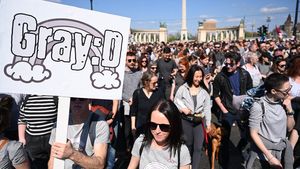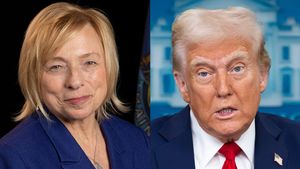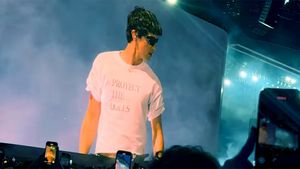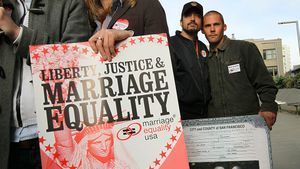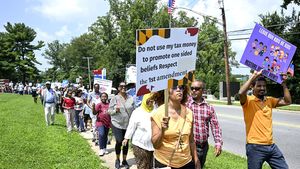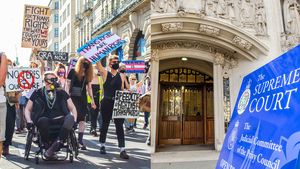The average moviegoer may not know Cole Doman's name yet, but the critics sure do--and they love him. The Pennsylvania native, who studied theater in Chicago, delivered a breakout performance as Henry Gamble in Stephen Cone's Henry Gamble's Birthday Party. Set against the backdrop of teenage Henry's backyard birthday party, the film explores the tensions that can arise when homosexuality and religion occupy the same space. In this case, they occupy the same family.
RELATED | Must-See: Henry Gamble's Birthday Party
Confused and closeted, Doman's character doesn't need to wonder how his community views being gay. Henry's father (Pat Healy), a conservative minister, presides over a congregation that resists modern attitudes towards sexuality, and oversees a home that even shuns alcohol. While Henry is the obvious focus of the film, the toll religion takes on the rest of the family is also explored, with respect and probing insight.
We caught up with Doman in between rehearsals for a Chicago production of Bye Bye Birdie, various shorts, and the web series he's been working on, to discuss the film, it's reception, and being gay in the industry.
Out: You play the role of Henry in Henry Gamble's Birthday Party, the film's teenage protagonist. How did that part come about?
Cole Doman: We shot Henry Gamble's Birthday Party going into my senior year. I signed with my agent when I was a sophomore, they sent me a breakdown of the film, and I actually went in for a different role--I went in for Henry's friend John, who plays the guitar, who's more religious. It didn't really feel right, but I didn't say anything because I was new, and I was young--I'm still young, but I was younger then, had way less experience. So I went in and did my best, and Stephen Cone, our director, was like, "How do you feel about the role of Henry?" And I was like, "Yeah absolutely, I'd love to read for it." So I had like ten minutes to prepare, and then I went back in and did it. I got a call back, and then I booked it! It was really exciting.
What was it that attracted you to the film?
When I read the script, I could really sympathize with Henry. I grew up in a fairly religious family, I went to Catholic school, I have religious grandparents and family, and I'm gay. When I was younger, I started realizing I was interested in things that maybe didn't agree with what the church deemed correct--not to mention I'm a huge music person like Henry, and that's always been my escape. Stephen works similarly to me, in that music is a big part of prep for a role. So he sent me a playlist of all the songs he thought Henry might listen to, songs that would comfort him or energize him, and I loved it. Stephen also had a similar upbringing, as far as religion. So for me, it really felt like a dream come true, to be able to tell Henry's story.
This story would be topical at any time--the pull between religion and sexuality--but it's quite pervasive today in America, especially following the legalization of marriage equality. What was it like to delve so deeply into that toxic environment?
I read the script as someone in a city, surrounded by like-minded people, so originally I was thrown off by how blatantly it was said that being gay is a sin, an eternal sin. I think that, when I was approaching that, I had to understand--because I have a lot of people in my life who I love who are really devout, and so does Stephen--that these aren't hateful people. I think Henry Gamble does a really great job of that. It's not making fun of anyone, it's opening eyes to a world of ignorance, and while ignorance can be hateful, I think in the case of Henry Gamble, it is still this loving community. It just takes some people longer to open their eyes to choosing love. If I've taken anything from my religious upbringing, it's my moral code, what I deem to be good and bad, what's right and wrong, and love. That's how I learned to love, from my family's love, but it's a huge struggle.
While religion's impact on sexuality is the most important dimension for Henry--and perhaps what the audience will take away most--the film really looks at the way it impacts the rest of the Gamble family.
Yeah. Guilt and shame and religion really affect them all. You see the character of Autumn, my sister, go through this crazy arc, in a matter of hours. I think Henry Gamble is a departure for Stephen in that it isn't just about one person, it's about the whole family. I think the mother and father relationship is really beautiful.
The film has been getting a great reception, what's that been like?
We're kind of blown away by the amount of love people are having for our movie. We love it a lot, but it's always different when that gets affirmed by your community. We had a great, sold out showing at BAM Cinema Fest, we had a theatrical release in New York earlier this month, we have one in Chicago, and then we're showing in Los Angeles. A lot of reviews have been coming in since we've opened, which has been equally as exciting, and then we're going to DVD and VOD in May, which will make it much more accessible to people. And we had this great profile in the New York Times' 'Anatomy of a Scene' series.
Have you had people reach out who've maybe had a similar experience to that portrayed in the movie?
Yeah, I've been told a lot that it was quite a delicate portrayal. "Gentle" was a word that a lot of people used, and that to me is such a gift, because then I feel like I'm representing--the last thing I'd ever want to do is make people in that situation more uncomfortable than they already are. I think once we get VOD and DVD, we're going to be much more accessible to the younger generations. Right now, even if the people seeing the film can relate to Henry from their own childhood, they're not living it any more. So I'm interested to see the feedback once we have 15 and 16-year-olds watching this film.
You're a gay actor, this film is about a gay character--have you any thoughts on being gay in the industry?
I was never naive about it, but I also hadn't really thought too much about keeping my life under wraps. I'm a gay actor, and people really started asking me about it after Henry Gamble. I always--I mean, I'm gay. I'm not going to deny who I am, that's not going to bring out my potential. I think I'm the strongest in my craft when I'm comfortable with myself, and I think if I cut a huge part of myself off--my sexuality--then that wouldn't be honest. And that wouldn't be fair to myself, to the people I'm working with, to my community of queer actors. And it's definitely about agency for me. I think if I were to not get a part because I'm a gay actor, then those aren't people I want to be working with.
As an aspiring actor, what's it been like for you watching as more actors have come out, more roles have opened up?
I feel two ways about it, actually. It makes me sad that it's taken so long, that people have had to keep their lives so private for so long. But it's also hopeful, especially over the past two or three years, it feels like the community is stronger, because people are allowing themselves to be freer.
I idolize Todd Haynes and Andrew Haigh, these queer filmmakers who are now getting all this press--and it's not just the market of LGBT movies, it's now huge blockbuster movies that are being recognized by the general public. These stories they're telling have to be told. I was totally behind the Oscar campaign for Tangerine, I was following it since Sundance, and I think it's incredible. You know, these new shows like Transparent, the growing visibility of trans actors, it's really important to me. I think there is a movement, and I think we're being recognized, and you know, you just gotta let us do it. Because we're smart! We're really fucking smart people, and we're strong artists. If no one gives us an opportunity, then they can't see how talented we are.
What would your spirit animal be?
My spirit animal is a fox. They kind of look like puppies, but they're also very sly--but not sneaky! That sounds bad. Not a negative connotation. That's just what everyone's told me my whole life.
And what do you hope people will take away from the film?
I hope they take away, that you should choose love, because that's the only thing that really matters. Simple, but I think it's something that can be really hard sometimes.
For screening information, visit HenryGambleMovie.com.
